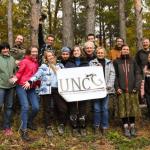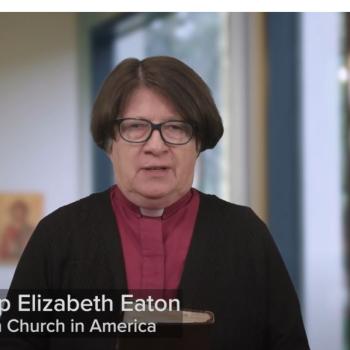Bishop William Gohl of the Delaware-Maryland Synod gave a speech at the Synod Assembly on May 14, 2022, explaining why he will join the Latiné bishops of the ELCA calling for the discipline and removal of Bishop Megan Rohrer if Presiding Bishop Eaton fails to act.
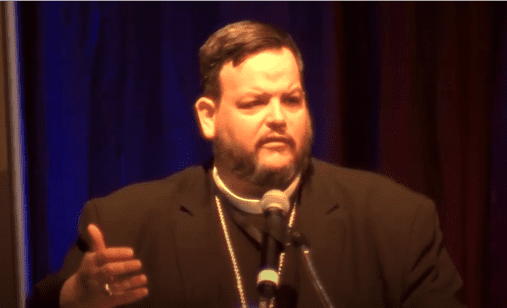
On Dec. 12, 2021, a white bishop of the ELCA, Bishop Megan Rohrer, told a Latiné congregation to “wait” after they had removed their pastor without due process or adjudication. The white Presiding Bishop of the ELCA, Bishop Elizabeth Eaton, is once again telling us to “wait” for her decision after receiving the report from the Listening Panel MORE THAN A MONTH AGO. As Bishop Gohl says — which you can read in the transcript that follows — there is urgency to address this because Bishop Rohrer and the Sierra Pacific Synod Council have done harm. And that harm continues.
You can watch Bishop Gohl’s speech which begins at 1:30:00, here: https://www.youtube.com/watch?v=NHq2d9KMhR4. Note that this was not a planned speech. Someone asked from the floor that he speak to the situation in the Sierra Pacific Synod. He spoke for 15 minutes to explain what was happening in that synod and why it mattered for the whole of the ELCA.
A time of listening
Just as important as Bishop Gohl’s speech were the responses from members of the assembly which begin at 1:54:34 and end at 2:23:12. I urge you to view these comments as well. The pain that has happened to marginalized people and communities in this church is something to which we must bear witness if we are to take steps toward accountability, repentance, reconciliation, and – eventually – healing.
Bishop William Gohl’s Speech
The following is a transcript (lightly edited for ease of reading) of Bishop William Gohl’s speech delivered on May 14, 2022.
For those of you who are coming to this conversation unknowing about anything that’s happening in Sierra Pacific Synod, I’m going to start with a little bit of background. The ELCA is divided into 65 geographical synods and one non-geographical synod (Slovak-Zion Synod). Those synods cover a piece of geography of the United States. The Sierra Pacific Synod covers a part of California and Nevada. The Bishop of the Sierra Pacific Synod is Bishop Megan Rohrer who was called by that synod at their assembly last year (2021).
Consultation v. Discipline
Bishop Rohrer inherited a process of consultation. There is a difference between consultation and discipline. Consultation is when conflict within a congregation or a synod requires mediation from the outside. Discipline means that a charge has been filed against a pastor or a congregation that must be adjudicated.
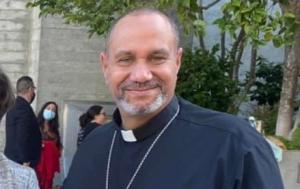
Pastor Rohrer inherited a process of consultation that was underway by their predecessor, Bishop Mark Holmerud. Rohrer was elected in May and took office at the end of August. All of these things were happening while that transition was happening. And what was happening was that there were charges brought to bear about the ministry of Pastor Nelson Rabell González and Misión Latina in Stockton, Calif.
During that synod assembly, that process spilled out onto the assembly floor with an accuser of Pastor Rabell speaking from the microphone and then becoming elected to serve in leadership in that synod.
Mission developers are at a power disadvantage
In this church, mission developers are at a power disadvantage because their ministry is extended to them, not by the community that they serve, but by the synod council. And it is largely funded by the synod council and the churchwide organization.
As that process began to unfold in the transition between Bishop Holmerud and Bishop Rohrer taking office, there seemed to be a bit of a truce. [After leaving his previous call, St. Paul in Lodi], Pastor Rabell González had received a call to serve from the synod council [in March 2021] and his ministry was continued. Apparently, however, the process continued to unfold in ways that were not public.
A pastor or deacon normally receives their call in this church from the community they serve, such as a congregation, for example. But mission developers normally receive their call from the synod council, the director of evangelical mission, and the bishop.
It came to pass that Bishop Rohrer moved to remove Pastor Rabell González from his call as part of their investigation of accusations. And they chose to do that at a very insensitive time and place, which was while the congregation of Misión Latina was celebrating the Feast Day of the Virgin of Guadalupe. My suspicion is that most of our congregations in the Delaware-Maryland Synod do not celebrate the Virgin of Guadalupe. But that is a tremendously holy day for Latiné communities, particularly those who’ve emigrated from Mexico. It would be the equivalent of Christmas Eve or Easter Sunday in your congregation.
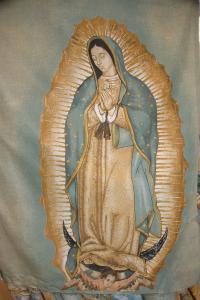
The bishop met with Pastor Rabell González and terminated his call just an hour or so before that service. Imagine coming in on Christmas Eve or Easter to find a stranger presiding over your liturgy with other people from the synod sitting in the congregation.
And a white bishop of this church told a Latiné community to . . . wait.
They would be told what was happening after the service.
But the congregation stood up and said, “No, we need to know.” And the congregation, dissatisfied with the information they were being provided, got up and left. They continued their celebration out in the streets.
The process that triggers for the removal of a pastor in a disciplinary process is either by adjudication or resignation. Neither of those things happened at that time.
And Pastor Rabell González was obligated, as all pastors and deacons are when they are leaving a place of ministry, to request “On Leave from Call” status. In our synod, this is routinely granted to anyone who asks. It’s a way for a pastor or deacon to remain on the roster, where they are still a pastor or deacon of this church, even though they are not at that moment serving a community. And that happens for a number of reasons. It happens sometimes in transitions or for graduate study. Or to tend to family medical leave or to raise children.
Pastor Rabell González made the request for On Leave from Call, but the bishop denied that request. And the synod council sustained that decision.
So, in essence, Pastor Rabell González was removed from the roster of ordained Ministers of Word and Sacrament of this church without any due process, without any adjudication.
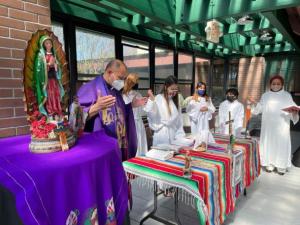
And as a result, when that action was taken in January, not only did Pastor Rabell González’s community stand up and then leave the ELCA to form a new mission [Iglesia Luterana Santa María Peregrina], but others around this church stood up as well. They said that the actions of the Sierra Pacific Synod Bishop and Synod Council were beyond the pale and that there needed to be transparency and accountability.
Because when the Sierra Pacific Synod Council and Bishop removed Pastor Rabell from the roster, they didn’t do that just in their synod. They took action on behalf of the whole church, including everyone sitting in this room. Again, without any process of adjudication.
There is also no process of appeal.
There is only one way for Pastor Rabell González to be reconsidered for the roster. The bishop solely has to agree that Pastor Rabell González might re-enter the candidacy process. Then the candidacy committee would start the process of candidacy as if the person was a new applicant starting fresh, not a pastor of the church for 20 years.
Our constitutions make very little provision for how to address a situation like this that is so extraordinary. But there’s been tremendous pressure for the Presiding Bishop of our church, the Conference of Bishops, and any other leadership team to step in and do something.
Though the options are limited, there are options.
To date, our Presiding Bishop took action to impanel a Listening Panel. A committee of three people – one of Bishop Rohrer’s choosing, one of the Latiné community’s choosing, and one of Bishop Eaton’s choosing – was dispatched to the Sierra Pacific Synod. They were on the ground to listen to all of the parties involved.
I believe that the committee did that work and did so faithfully.
The problem is, we still have not heard about that committee’s work. And they submitted that work to the Presiding Bishop’s office, I am to believe, five or six weeks ago.
I supported the call for that panel, and I’ve been participating in conversation with the Conference of Bishops. But what I want you to hear is that there are precisely four Latiné members of the Conference of Bishops*, including our beloved Assembly Chaplain, Bishop Leila Ortiz. Those four members of the conference have clearly and valiantly led the effort for transparency and accountability.
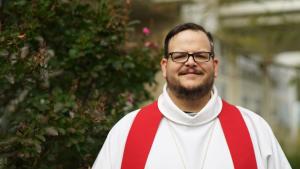
And so, I have stood alongside them, representing you [the Delaware-Maryland Synod] in this process. But because the issue began with a Latiné community that was disenfranchised, I’ve chosen to act in concert with the Latiné bishops and to try to amplify and center their voices in the conversation.
Bishop Eaton had suggested that we would hear something a little bit sooner. Then this last week, she released a four-line statement thanking the committee for its work and telling us that we will hear something by the end of May.
My suspicion is that some of you may say, “Well then, why are we talking about this? We’ll hear from the Presiding Bishop at the end of May. It’s not that far away. What’s the big deal?”
The big deal is this. In an overwhelmingly white space, in an overwhelmingly white church, and a church that begs to grow younger and more diverse, a community of Lutheran Christians supported and encouraged by your prayers and mine and the mission dollars that we remit, was totally disenfranchised. Their power, which was already limited, was removed. And that created a situation of harm.
Every day since December 12, 2021, you and I have become complicit in that harm. And that harm is ongoing.
Some of you might think, “Well, you know, Lutherans are German and Scandinavian.” But there has been a Latiné Lutheran community in the U.S. for over one hundred years.
They are not “those people.” We are they, and they are we.
So, a community has been disenfranchised. It’s a community that this church – all of us – desperately needs to be part of us.
Harm is ongoing. And the work that we’ve done to build cultural bridges so that we can be Lutheran Christians together and not conform to some old Germanic way of being church, is harmed every day.
With all respect to my bishop colleagues, Bishop Rohrer, and Presiding Bishop Eaton, why didn’t anyone go? Why didn’t anyone from the leadership of this church go sooner?
Where is the pastoral care for the community of Misión Latina that has now left us to become something new [Iglesia Luterana Santa María Peregrina]?
Where is the care for an Assistant to the Bishop [Rev. Hazel Salazar-Davidson] in the Sierra Pacific Synod, who boldly broke the silence? She shared her story of having been traumatized and harmed by being made the bearer of hard news that they didn’t believe in themselves. Simply because she was the only person on the staff who spoke fluent Spanish.
Can you imagine that situation? Being in a Latiné community and having a bishop who carries power standing alongside you, a Latina pastor of the church. And they’re saying: “You tell them.”
In case you are wondering about the veracity of all this information, there is an archived e-letter where I have posted all of the links to the information so that you can follow this for yourself and not take my word for it. You can see these things for yourself.
The issue has become increasingly more urgent.
This is because generations of work in the partnership we share with the Latiné community is coming apart. How we will ever have credibility and trust restored eludes me at this time.
Personally, as the bishop of this synod, I have no authority over Bishop Rohrer and their ministry. But more and more is coming to light about this bishop and their ministry that leads me to believe that if they were a pastor serving in this synod, they would come under the church’s discipline for their actions.
So, I will simply say this to you. I am following the lead of our Latiné leaders. I’m trying to physically and spiritually and emotionally put my body in the way of that which harms them from the larger life of the church.
I will be one of the people who joins them in calling for the discipline and removal of Bishop Rohrer if Presiding Bishop Eaton fails to act.
Ephesians 4:3 says: “Together we should make every effort to maintain the unity of the Spirit and the bond of peace.” However, unity is not uniformity. I’ve said it before and I’m going to say it one more time.
Church “unity” is a false altar on which marginalized people are sacrificed.
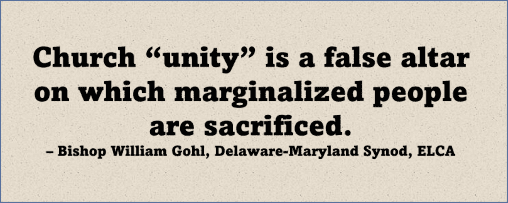
In this synod, we will stand in solidarity with the people of Misión Latina. And we will do everything that we can to make sure that Pastor Rabell and that community gets due process. And that that process is open to the scrutiny and the questions of this church.
My sense is that this will require further action from our Synod Council. And I’m pleased to tell you that I believe that we enjoy the support and the commitment of that Council to act. Even if that means escrowing our dollars, suspending our participation in leadership, and making legislative action on the floor of the Churchwide Assembly.
Please join me in prayer.
Gracious God, this is your church, and we are your people. We pray that you would help us to recognize the Spirit that joins us together in the one unity that we share, which is Jesus Christ. Bless us to have bold faith in Christ and bold witness in solidarity with our Latiné siblings in Sierra Pacific Synod. And all of the Beloved Community that you have gathered and called church. And for the Lutheran Christian part of that church that you’ve entrusted to our stewardship and our care.
Be with everyone involved. Grant your Spirit’s wisdom and guidance for our Presiding Bishop, for our Latiné leaders in the Conference of Bishops and the church, and for the communities most impacted and harmed. For Bishop Rohrer and their Assistant, Pastor Hazel Salazar-Davidson. For Pastor Rabell and his family. And for all of us who wait, watch, and hope for this church to walk the walk of the talk that we talk. Help us, O God, in Jesus name, to do better. Amen.
*The four Latiné bishops in the ELCA are: Bishop Leila Ortiz (Metropolitan Washington, D.C. Synod), Bishop Felix Malpica (La Crosse Area Synod, Wisconsin), Bishop Pedro M. Suárez (Florida-Bahamas Synod), and Idalia Negrón Caamaño (Caribbean Synod).
Read also:
Part One: The Removal of Rev. Rabell-González: A Case Study in ELCA Corruption and Racism
Part Two: ELCA Fires Whistleblower, Rev. Nelson Rabell-González
Part Three: The Day an ELCA Synod ‘Disappeared’ Pastor Nelson Rabell-González
Part Eight: 6 Reasons Why Rev. Nelson Rabell-González was Denied Due Process
Part Twelve: Remove Bishop Megan Rohrer? Follow the Pattern, Follow the Money
Part Thirteen: The Corporate Captivity of the ELCA
Part Fourteen: Bishop Megan Rohrer Doubles Down on Abuse of Power with “Wellness Checks”
For a complete compilation of all documents, blogs, commentaries, and posts from all parties about the situation in the Sierra Pacific Synod, visit this website by Shruti Kulkarni: https://whathappenedinthesps.weebly.com/. This website compiles communications relating to the controversy for accountability, clarification, and ease of access.
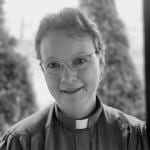
The Rev. Dr. Leah D. Schade is ordained in the ELCA. She does not speak for the ELCA; her opinions are her own. She is the author of Preaching in the Purple Zone: Ministry in the Red-Blue Divide (Rowman & Littlefield, 2019) and Creation-Crisis Preaching: Ecology, Theology, and the Pulpit (Chalice Press, 2015). She is the co-editor of Rooted and Rising: Voices of Courage in a Time of Climate Crisis (Rowman & Littlefield, 2019). Her latest book, co-written with Jerry Sumney is Apocalypse When?: A Guide to Interpreting and Preaching Apocalyptic Texts (Wipf & Stock, 2020).
Twitter: @LeahSchade
Facebook: https://www.facebook.com/LeahDSchade/



